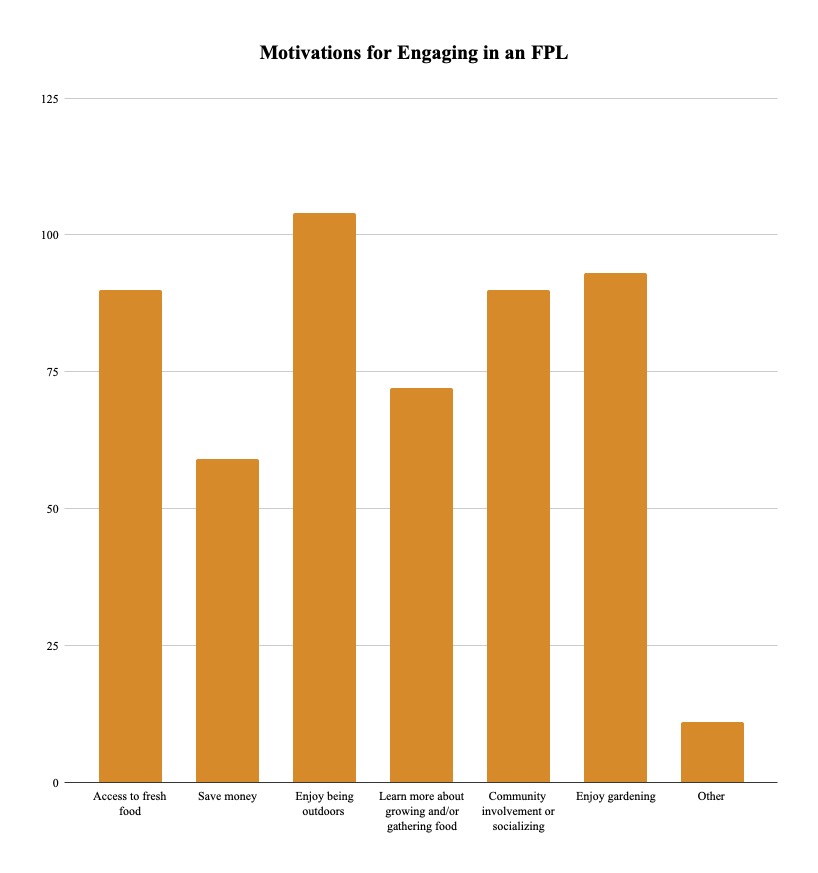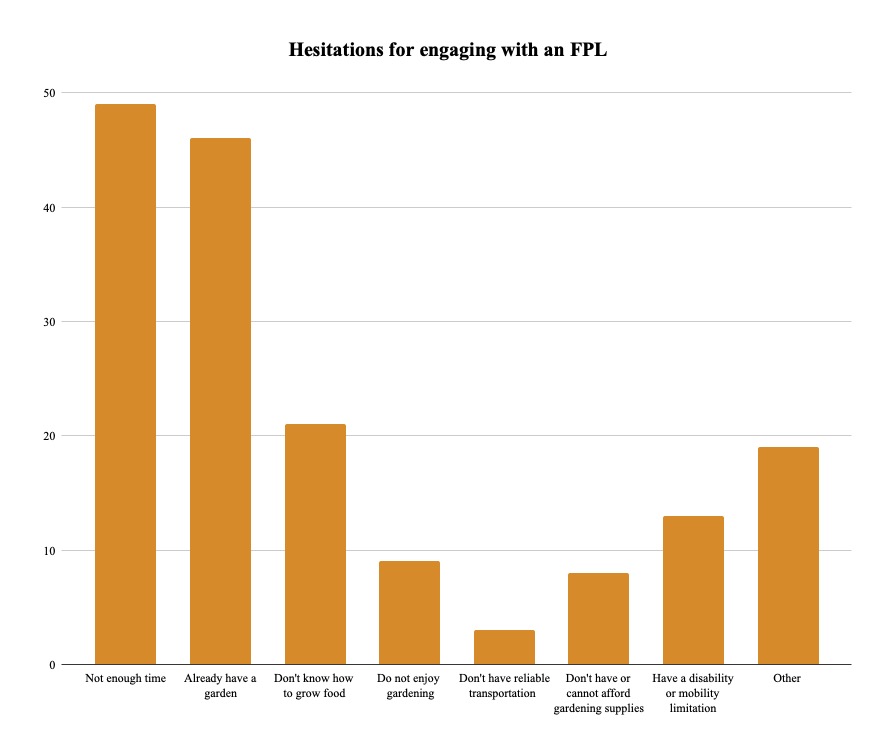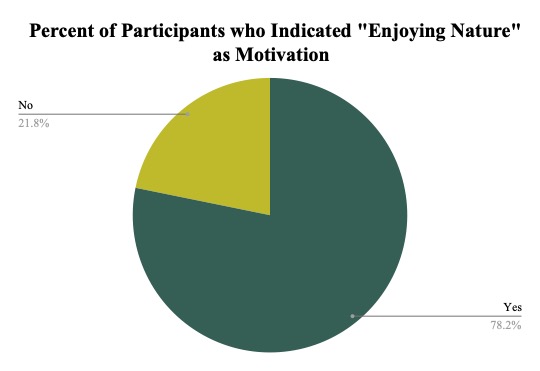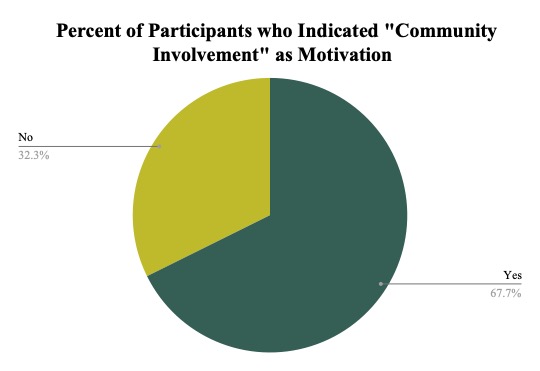A Food Productive Landscape can potentially provide structured opportunities for social gathering and connection with nature. Responses from the survey and interviews showed that folks were interested in this idea. The hope is that our findings promote some of the goals in Thompson County Park’s 2020 Master Plan such as connecting visitors to natural resources and expanding opportunities for community engagement.
Key Points
- Enjoy being outdoors, enjoy gardening, access to fresh food, and community involvement or socializing were most frequently listed as motivations for engaging in an FPL
- Time commitment and already having access to a garden were noted as common hesitations for engagement.
- Overall reception to adding an FPL to the park seem positive, however many respondents had concerns about the implementation and maintenance process.
In exploring how Food Productive Landscapes (FPLs) can enhance social interaction and nature enjoyment at Thompson County Park, we asked people to speculate about engaging with FPLs as a further way to examine their interest in the idea.
Motivations

The biggest motivators for using FPLs for survey respondents are enjoy being outdoors, enjoy gardening, community involvement or socializing, and access to fresh food.
With over 100 respondents expressing a desire to enjoy being outdoors and almost as many showing interest in gardening, FPLs have the potential to engage with the diverse needs of people who value Thompson County Park. 59 respondents are interested in both community involvement and learning about food cultivation, showing that there is an opportunity to create engaging and educational programs at the park. One respondent talked about how social gathering can happen organically while participating in community gardening, “Well, organic food, healthy food [begins with a] connection with the natural world. And then also, the community aspect of it. Perhaps meeting people, either seeing them tend their individual plots, overseeing them, working on a large garden that’s, you know, for the community. So just being part of the social aspect of it.”
Other responses mention wildlife conservation, sustainability, and participation from young folks.
Takeaways
People like the idea of having a special place in Thompson County Park where they can grow food, like fruits and vegetables, without harming the natural environment. The people mentioned in the quotes believe that an FPL would give them a chance to enjoy nature and be outside in the fresh air. They think it’s important for people to spend time outdoors and feel connected to the world around them. They also like the idea of working together on a garden that other people in the community can enjoy and benefit from. It’s a way for people to connect with others and the natural world.
Hesitations

The largest hesitations for using FPLs are not enough time, already have a garden, don’t know how to grow food, and other.
With not enough time and already have a garden being the most common hesitations, it is important to acknowledge that these do not voice opposition to an FPL in Thompson County Park. What these hesitations signal is that having enough community participation in an FPL in Thompson County Park may be an issue to address, suggesting the potential need for community outreach to foster greater participation amongst residents. One respondent said, “With community gardens, it can be hard to sustain. A group may start with it, but then lose interest after time, and it’s hard to find another group to take it over.” Participation is needed to ensure the garden is maintained, cared for, and food-productive.
Other hesitations mentioned not living nearby or not being a frequent user of the park, inability to access due to overcrowding and vandalism, and lack of knowledge of FPLS and participation. In the words of a respondent, “Thompson Park is heavily used and is not the appropriate place for growing food. As someone who has been a part of community gardens before, I have found the more used the park is, the more the food gets destroyed or stolen.” Some folks felt hesitant about how adding an FPL to Thompson County Park will take away from current engagement and existence of wildlife and natural areas in the park. One responded, “I’m concerned that the park will lose whatever vegetation, shrubs and trees to make way for an FPL… It is hard for me to see how any FPL would not lead to reducing the area where native plant life and dependent insect and animal life are now currently thriving.”
Takeaways
Many people who responded to the survey said they don’t have enough time to participate in an FPL or they already have existing access to a garden. This doesn’t necessarily mean they don’t like the idea of an FPL in Thompson County Park, but it suggests that getting enough people to actively participate may be an additional barrier. Some people mentioned that they don’t know how to grow food, which could be another reason why they might not get involved in the FPL. There are also concerns that creating an FPL in Thompson County Park might lead to the removal of existing plants, trees, and shrubs. This could negatively affect the native wildlife that depends on these natural areas to survive.
Final Remarks
The idea of creating a FPL in Thompson County Park has generated both excitement and concern among community members. An FPL in Thompson County Park can advance goals of social gathering and engagement with nature by providing a dedicated space for community members to grow food together, fostering a sense of belonging, and encouraging outdoor activities. Collaborative gardening activities can create opportunities for social interaction, knowledge sharing, and the development of new friendships. To ensure success, it is crucial to address concerns by offering workshops, flexible scheduling, and making the FPL accessible. By balancing the benefits of an FPL with the need to preserve the park’s ecosystem, Thompson County Park can serve as a space that promotes both social engagement and environmental responsibility.

